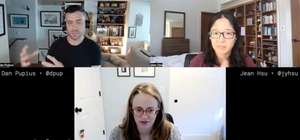Someone I talked to recently was surprised to hear that with such a public-facing role, I still get nervous when I have something external on my calendar for the day (or even, for the week) — whether that’s recording Lead Time Chats episodes or meeting new people over Zoom.
I lean pretty hard on the introverted side of the introvert-extrovert spectrum, so I myself am very surprised that two full seasons of Lead Time Chats are complete!
In some ways, widespread remote work created a more conducive environment for me to do this kind of work, from the comfort of my own home.
The last year and a half hasn’t been an easy one, especially for managers, so I’m glad that I’ve found a way to help support engineers and engineering leaders, that is genuinely enjoyable and not too draining!
At the end of each season, I like to pause to celebrate the completion of another season, gather some feedback, and share some highlights.
I really appreciate whenever anyone shares the impact Lead Time Chats has had on them, so was particularly excited to receive this feedback:
- “I wish I'd had this podcast when I was starting my career a decade ago. Even as an experienced engineer, I get tons of insight from listening to Jean's conversations. I also really appreciate how this series elevates voices from underrepresented groups.”
- “Watching or listening to the chats has served as a sort of therapeutic session on leadership. It's been a long and taxing last 1-1.5 yr for managers. 🙏”
And here are some of the highlights from the latest season:
Season 2 Highlights
Camille Fournier on making boring plans:
“You do have to be thoughtful culturally about not over-rewarding the people who only do the new stuff and forgetting about the people who actually do the tedious work to finish it, because then you just end up with like a graveyard of alpha beta products that have never quite gone to GA.” [complete episode]
Tess Rinearson on early career engineering managers:
“You're going to have a different relationship with every person on your team. You will be more of a mentor to the more junior folks perhaps or even to your peers. You may be more of a supporter or an unblocker for the more senior folks. And just going in and understanding that a little bit of a different style is going to work differently depending on each person you're working with and who they are and where they're at in their career.” [complete episode]
Kim Scott on building for systemic justice:
“It's really important when you start a company, especially if you're a founder of a company, but when you're a leader of any sort to realize that you weren't designing these systems that are going to impact how people behave. And if you don't design the systems specifically for justice, you're going to wind up with systemic injustice.” [complete episode]
Sumeet Arora on moving on from a big company:
“There is a beautiful world outside of all the big companies, beautiful world. It's full of opportunity. It's not like it's a land of ocean with sharks. No, it's not. It's a nice world, so surround yourself with people who have that growth mindset, who will support you, because they themselves believe in the fact that people can go across domains and do very well or even better in that domain.” [complete episode]
Rachael Stedman on IC manager work:
“If there's like a prioritized list of what's most impactful for the org and you're most excited about number three. I think it's better to do that than go after number one, if it's something that you're excited about. This is where a lot of magic happens, 'cause you have these individuals who are personally very passionate about an area and they do something very creative or different because they're excited about it. And they're bringing a lot of energy and momentum to that initiative that otherwise wouldn't be there.” [complete episode]
Chris Bee on behaviors of effective engineering leaders:
“There's a sort of a multiplier effect that you're able to create as a people leader. Where as an IC, one hour of work equals one hour of output. But as a leader, one hour of work in a coaching or guidance or career advice style environment can equal hundreds of hours of productive work.” [complete episode]
Lynne Tye on the engineering hiring landscape:
“What I've been relating it to is like a game of musical chairs, but with extra chairs. There's a lot of options and people are really, really hiring pretty aggressively right now. On the company side, it's worse, but for job seekers it's great. There's a lot of competition in terms of comp, and so people are kind of outbidding themselves... I feel like a broken record, but it's your pick of the litter, and you can be as selective and demanding as you want.” [complete episode]
Beau Lebens on distributed team meetups:
“One of the things that we certainly learned is that where you could maybe get away with a looser plan in a face-to-face meetup, if you're doing it online, especially if people have to get up at some weird time because of time zones, you really want it to be more organized, more structured, more scheduled. So people have gotten a lot more rigorous with planning their team meetups.” [complete episode]
Indrajit Khare on getting acquired by Google:
“There's this picture people have in their minds about, oh, it's Google, all the engineering must be perfect. And then you realize, actually, people are people. They have the same constraints between deadlines and the features that have to build and everything. And you're going to be living in a similar place where the code will be messy here and okay here, pretty good there. And you kind of have to navigate all of that. So that was definitely a surprise.” [complete episode]
Jack Danger on technical debt:
“It works. And nothing depends on it. And it depends on nothing. What is the interest rate on that? It's a 0% loan. You can pay that down tomorrow or in five years, it takes exactly the same amount to pay. But something getting worse, especially if it's in the middle of your system where you have to encounter it a lot, and every day you're making changes in your build system or your development set up. And every day you're paying the price. That is a very, very high interest rate.” [complete episode]
Sarah Milstein on setting remote and hybrid teams up for success:
“Meetings do three things for us. They help us establish personal connections, they let us share info, and they help us make decisions. And some meetings do all of those things. And some meetings do a combination or just one of them.
But when we are now being really intentional about how we're holding meetings and why and who's involved and what we're trying to do with them, being aware that we have a couple of different implicit goals is really important and can help us make really explicit decisions about how we want to work together and what we want to get out of them.” [complete episode]
Ellen Wong on working on hybrid teams:
“If I were a remote candidate, I would ask, what is the percentage of your leaders or employees that are remote? Because if you're the only one, chances are, it's going to be tough, because a lot of what changes processes or get people's behavior to change is empathy. If you're disproportionally unique and disadvantaged, it's going to be an uphill battle regardless.” [complete episode]
Coming Up Next...Season 3!
Season 3 is coming up soon with a few chats already recorded or scheduled with Jen Kim, Kate Heddleston, Dan Na, and more amazing leaders. There are still plenty of slots, so if there is someone you’d particularly like to hear from, drop me a note at jean@range.co.
You can subscribe to the Lead Time Chats podcast on Apple, Spotify, or wherever you listen to podcasts, so you don’t miss any episodes. And if you’ve enjoyed it, it would be so very helpful if you could leave a rating or review.
We’ll also post new episodes weekly to Lead Time Community, along with other leadership topics, industry discussions, and community reflections. Lead Time Community is a space for engineering leaders to connect, share, and grow with other engineering leaders. Join us there!








